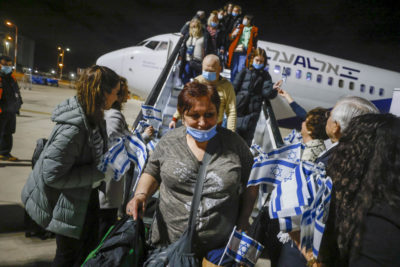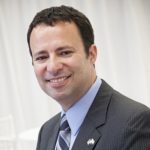
David Saginaw, our Federation President, and I are heading to the airport this evening to fly to Poland. We’ll meet with refugees, rescue workers, and our partners on the ground, as we travel to the Ukrainian borders. We’ll update you from there. At the end of last week, our national Jewish Federations allocated an additional $9.2M, coming to a grand total of $24.5M to meet immediate needs in Ukraine and in surrounding countries, including:
- Providing housing, clothing, medication, cash assistance, mental health services, security, and transportation for refugees fleeing the war and those seeking to make Aliyah.
- Ensuring the secure evacuation of affected individuals from areas under immediate threat or where active hostilities are already taking place.
- Expediting the rapid Aliyah of those individuals or families who wish to move to Israel and facilitate their absorption on arrival.
- Trauma-focused therapy and emotional first-aid training for those helping refugees outside of Ukraine, as well as mental health professionals treating patients inside of Ukraine.
- Supporting delegations of medical professionals on the ground in Poland and Moldova to treat incoming refugees.
Of this total sum, over $1.6 million has come from Greater MetroWest. I’m so proud of our response, and grateful for our generous donors and supporters, and for a community that steps up when called. Here’s the update on the situation on the ground from our national and international Jewish Federation system and partners. If you have any questions, don’t hesitate to contact me.Both Russian and Ukrainian forces are suffering significant losses as Russia pushes to win more territory. With intensive battles continuing, millions of Ukrainians, including tens of thousands of Jews, are still attempting to flee the country. THE LATEST DEVELOPMENTS• Russian troops are moving closer to Ukraine’s capital Kyiv and significant destruction is being seen in cities and towns as Moscow continues with its bombardment of the country. Despite many early predictions of a swift Russian victory, Kyiv has still not fallen. Russian troops have reached a point that is around 15 miles from the city’s center.• The cities of Kharkhiv, Mariupol, Mykolaiv, Dnipro, Chernihiv and Sumy are also under ongoing Russian attacks. Ukrainian President Volodymyr Zelensky said “a few small towns just don’t exist anymore. … They are just gone.”• Russian missile strikes hit the International Peacekeeping and Security Center (IPSC) near Lviv early today. Nine people were killed in the attack on the large military base. At least 1,300 Ukrainian troops have been killed in fighting so far.• The United States authorized $200 million in “immediate” defense aid and services, including military education and training, for Ukraine. In response, Russia has threatened to fire on weapons shipments to Ukraine, saying convoys with foreign weapons were considered “legitimate targets.” The warning raises the risk of direct confrontation between Moscow and the U.S. or other NATO countries.• On Friday, the mayor of the Ukrainian city of Melitopol, Ivan Fedorov, was seen on video being led away from a government building in the city by armed men. Russian forces have occupied the city since a few days after the invasion began, and the Ukrainian government is demanding Fedorov’s release.• President Zelensky said Ukraine is “more united than ever” but says there is a “lack of courage from the members of NATO to come together for Ukraine. It’s a huge problem. A philosophical problem of the alliance.”• Over 2 million Ukrainians have fled the war, with the majority going to neighboring Poland. Millions more are internally displaced. ISRAELPresident Zelensky and Israel’s Prime Minister Naftali Bennett spoke again by phone on Saturday night, and discussed ways to stop the fighting as well as Israel’s efforts to resolve the conflict. Once again, the idea of a summit between Zelensky and Russian President Vladimir Putin in Jerusalem is being discussed. Israeli government sources said that Putin was considering the proposal but said “it is premature to assess its chances.” Following the call, Zelensky tweeted that he spoke with Bennett about “Russian aggression and the prospects for peace talks” and asked for assistance in securing the release of the “captive mayor of Melitopol and local public figures.” Zelensky also said over the weekend that Ukrainian immigrants were among Israel’s founders, “who brought with them their history and their desire to build a great country, as it is now. So it’s not bad at all for us to have such mediation.”Some 600 new Jewish immigrants from Ukraine are expected to arrive in Israel today. This would be the highest number of olim in one day since the war in Ukraine began. Officials have said they expect tens of thousands of immigrants from Ukraine and Russia as a result of the war. Last week Israel’s Interior Minister Ayelet Shaked said the country would allow some 20,000 Ukrainians who were residing in the country illegally or were on tourist visas before the invasion to remain, while also granting permits to a further 5,000 non-Jewish refugees escaping the war. (All Jewish Ukrainians are allowed in and given citizenship under the Law of Return). Last night Shaked said that the 5,000 cap had almost been reached. Meanwhile the treatment of those arriving at Israel’s borders and awaiting permission to enter has caused something of an uproar in the Jewish state. Footage aired by Channel 12 on Thursday showed large numbers of refugees inside Ben Gurion Airport, including children sleeping on the floor and on a baggage carousel, as well as an elderly woman being treated after fainting. According to the report, some of the refugees had been waiting to enter the country for several days, without being given adequate food or a suitable place to rest.
In response, dozens of protesters called for accepting more Ukrainian refugees into Israel at a demonstration outside Shaked’s home in Tel Aviv on Saturday night. Hundreds more protested against the war and in favor of more Israeli support for Ukraine and refugees at a demonstration in central Tel Aviv at the same time. The protesters at Shaked’s home held signs in Ukraine’s blue and yellow colors that said, “Refugees welcome,” and “A Jew does not expel a refugee.” In response, Minister Shaked said, “Those images (at the airport) did not go over my head.” Authorities have since moved those people whose entry has not yet been authorized to a nearby hotel (although they are not permitted to leave the hotel until their requests have been processed and approved).Meanwhile Ukraine’s embassy in Israel is supporting a petition to Israel’s High Court of Justice against Israel’s limitations on the entry of refugees fleeing the war. The appeal argues that “the government’s cap on refugee entries violates international agreements between the nations as well as international conventions to which Israel is a party, and was not imposed with proper authority.”Russia’s most popular late-night talk show host, Ivan Urgant, who is often called “Russia’s Jimmy Kimmel,” is believed to have fled Russia to Israel with his family. Urgant’s show on Russia’s state-run Channel One, was taken off the air on February 21, only three days before Russian troops invaded Ukraine, in what commentators say was a result of his antiwar views. FLEEING UKRAINE, FEDERATIONS AND PARTNERS ON THE GROUNDIn less than three weeks, Jewish Federations have raised some $25 million for Ukrainian relief efforts. That money has already been allocated by JFNA’s special Allocations Committee to Ukrainian relief efforts being undertaken by The Jewish Agency for Israel, The American Jewish Joint Distribution Committee, and World ORT, as well as United Hatzalah, Hillel International, Nefesh B’Nefesh, HIAS, Israel Trauma Coalition, Hadassah Medical Organization, Chabad, and Shma Yisrael. At the end of last week, national Jewish Federations CEO Eric Fingerhut accompanied Ukrainian refugees on a flight from Warsaw to Israel as they began a new life in their new homes. At the same time, Federation leaders met at the US Capitol to ask Members of Congress to support extraordinary aide to Ukraine and to open the doors of the country to immigrants seeking safety and freedom. Dov and David are on their way to the Ukrainian border tonight and will report back.Earlier today (Sunday), Israel’s Foreign Minister and Alternate Prime Minister Yair Lapid visited The Jewish Agency for Israel’s Aliyah processing center in Bucharest, Romania and met with Jewish Ukrainian refugees set to make Aliyah this evening, as part of an expedited Aliyah process recently approved by the Israeli government. At The Jewish Agency’s center, Lapid heard from olim set to move to Israel who shared their touching personal stories of fleeing Ukraine. The Aliyah center in Bucharest is one of many facilities established by the Agency immediately after the war broke out in Ukraine last month. The centers provide humanitarian aid and assist the influx of Jewish refugees escaping the country and hoping to immigrate to Israel. In Bucharest alone, there are four Jewish Agency Aliyah processing centers that currently house some 1,000 Jewish refugees who fled Ukraine, in addition to other centers in Poland, Moldova and Hungary, where the Agency have taken in a total of 6,000 Ukrainian Jewish refugees. As reported previously, the American Jewish Joint Distribution Committee (JDC) has significant operations on the ground in Ukraine working with the population under fire, and along the border, working with refugees who have managed to escape. To date, JDC has assisted approximately 7,000 refugees, and it expects this number to continue to grow. JDC’s centers house over 3,600 beds in Moldova, Hungary, Poland and Romania. JDC has also organized a plane that was sent from Israel to Moldova containing five tons of blankets, shampoo, and hygiene products, as well as nine tons of food and medication that will be sent to Odessa. JDC is also looking into renting warehouses in Ukraine for storing humanitarian aid that has begun arriving by trucks. The Jewish Agency and JDC have both established emergency hotlines to assist the Jewish community in Ukraine. Israel’s Sheba Medical Center has opened a virtual hospital in the capital city of Moldova last week to enable medical staff in Israel to treat refugees from Ukraine crossing the border with the help of telemedicine technologies.Dozens of Israeli and Jewish organizations are working to provide humanitarian relief for Ukraine. Jewish Federations have activated our emergency protocols and are working closely with the Government of Israel and our partners to do everything in our power to support efforts that ensure the safety and well-being of the entire Jewish community in Ukraine.

